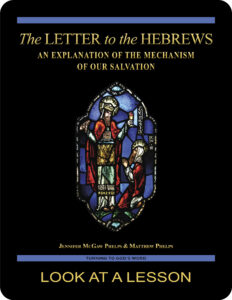hospitality
 How is hospitality related to love? The Letter to the Hebrews concludes by going through a moral section that outlines the moral consequences of not following through on the earlier messages in the book. In the Letter to the Hebrews 13:1–2 (NABRE) we encounter an interesting word choice in regard to the way Christians are advised to treat others.
How is hospitality related to love? The Letter to the Hebrews concludes by going through a moral section that outlines the moral consequences of not following through on the earlier messages in the book. In the Letter to the Hebrews 13:1–2 (NABRE) we encounter an interesting word choice in regard to the way Christians are advised to treat others.
The Letter to the Hebrews 13:1–2 (NABRE) mentions mutual love and hospitality, both containing the root φιλία (philia). This is one of the better-known Greek words because it is one of the four Greek words for love. Philia specifically refers to an affectionate regard or friendship and can be understood as the love that represents an equal level of giving and taking. The word translated as mutual love literally means “brotherly love,” and the word translated as hospitality literally means “love for strangers.”
The interesting feature in the usage of these words lies not in what’s said but in what’s not said. Christian thought tends to rely heavily upon a different Greek word to describe the infused virtue of love, the word agape. In the Letter to the Hebrews, the use of philia to describe how Christians are advised to treat others strongly suggests that the commonly understood, obvious distinction that agape is the Christian word for love and the other words are secular is not entirely the case, at least practically speaking. It also implies that love, understood in a Christian context, is much broader than many would have us think.
related topics: agape; brothers; First Letter of John; First Letter to the Corinthians; neighbor; philia & agape
you also may like our study of the Letter to the Hebrews (digital only)
 Many Christians struggle to understand one of the central mysteries of our faith: how Jesus can be both human and divine at the same time. The Letter to the Hebrews: An Explanation of the Mechanism of Our Salvation, an 18-lesson Catholic Bible study with an imprimatur, offers an in-depth look at the way in which Jesus’ dual nature allows for the salvation of humanity. The Letter to the Hebrews is designed to provide information that will encourage Christians to remain faithful. Click on the book’s cover to view a sample lesson.
Many Christians struggle to understand one of the central mysteries of our faith: how Jesus can be both human and divine at the same time. The Letter to the Hebrews: An Explanation of the Mechanism of Our Salvation, an 18-lesson Catholic Bible study with an imprimatur, offers an in-depth look at the way in which Jesus’ dual nature allows for the salvation of humanity. The Letter to the Hebrews is designed to provide information that will encourage Christians to remain faithful. Click on the book’s cover to view a sample lesson.
 Click on the picture of the statue of Moses with horns (above) to learn more about Lost in Translation. A new entry is archived each Monday. Contact us to receive Lost in Translation by email every week. You may use any of the contact links on our website to ask Matthew a question.
Click on the picture of the statue of Moses with horns (above) to learn more about Lost in Translation. A new entry is archived each Monday. Contact us to receive Lost in Translation by email every week. You may use any of the contact links on our website to ask Matthew a question.

Leave a Reply
You must be logged in to post a comment.